Magnesium plays a vital role in children’s development, influencing their bone health, muscle function, and neurological well-being. Despite its importance, many children do not receive the recommended levels of magnesium through their diet alone. This article explores the benefits of magnesium for kids, discusses sources from food and supplements, and highlights how Dr. Moritz’s Magnesium Gummies can help bridge this nutritional gap.
Magnesium is a mineral essential to many bodily processes, and it impacts everything from nerve function to muscle regulation and energy production.
In children, the role of magnesium is extensive. It promotes the growth of healthy bones, facilitates proper muscle and nerve functions, and is important for both energy production and emotional regulation. By supporting critical developmental areas, magnesium helps young bodies thrive in their formative years.
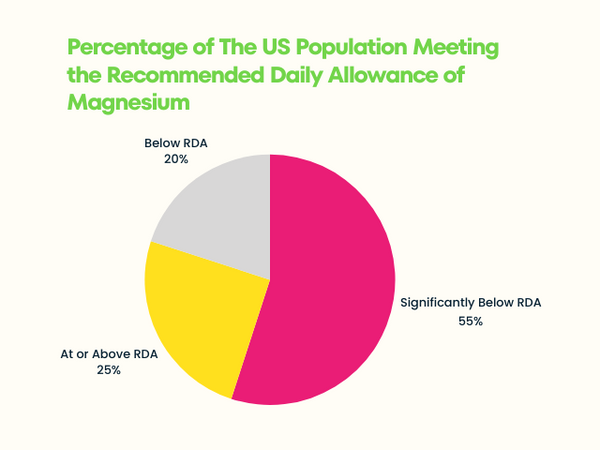
Yet according to studies, nearly half of Americans get less than the recommended levels of magnesium from their diets, which reveals a concerning gap in an important dietary component. This deficiency puts the spotlight on the need to raise awareness and action to ensure children receive adequate magnesium—an important nutrient that supports everything from cognitive development to physical health. Our exploration into magnesium for kids aims to provide parents and caregivers the insights necessary to bridge this nutritional gap, ensuring a healthier, future for the next generation.
Benefits of Magnesium for Kids
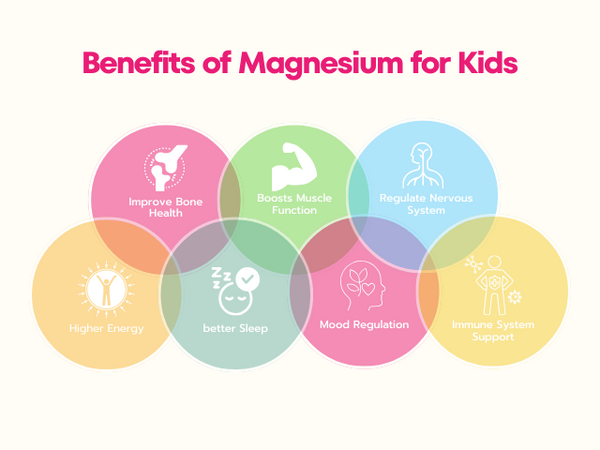
Magnesium is vital for growing bodies, impacting everything from energy levels to immune health. Magnesium activates critical physiological functions such as muscle and nerve operation, promotes regular heart rhythms, and strengthens bones. By converting food into usable energy, magnesium can help support the high energy needs of active children.
“When it comes to talking about the health benefits of magnesium, it's important to recognize its broad impact. Magnesium aids in the development of strong bones by working with calcium, which can prevent conditions like osteoporosis later in life. It also ensures that muscles and nerves function smoothly, a necessity for everyday physical activities and coordination. Furthermore, magnesium is instrumental in maintaining a steady heart rhythm and preventing arrhythmias, which are crucial for cardiovascular health,” explains Dr. Akash Kansagra, Chief Medical Officer of Dr. Moritz.
Important Benefits of Magnesium for Kids Include:
- Supporting Bone Health: Magnesium actively participates in bone development by helping to integrate calcium into bones, which is vital during the rapid growth periods of childhood. Adequate magnesium promotes not only stronger bones but also reduces the risk of future bone-density issues.
- Enhancing Muscle Function: Magnesium allows muscles to relax by acting as a natural blocker of calcium, which is necessary for muscle contraction. This balance helps prevent cramps and spasms, ensuring smooth muscle function which is crucial for everyday activities and healthy physical development.
- Regulating Nervous System: Magnesium plays a role in nerve function by regulating neurotransmitters, the chemicals that transmit messages throughout the brain and nervous system. This regulation helps maintain sharp mental function and a calm demeanor, aiding in better focus and behavior control.
- Boosting Energy Production: In the body, magnesium is fundamental for converting food into energy. This process is especially important for children, who require consistent and ample energy for their active and demanding daily routines.
- Improving Sleep: By managing neurotransmitter activity, magnesium contributes to relaxing the brain and body, facilitating easier and more restful sleep. Proper sleep is essential for cognitive and physical development in children.
- Supporting Heart Health: Magnesium aids in maintaining a steady heart rhythm and supports overall cardiovascular health by working with other electrolytes like potassium and calcium, which are critical for heart function.
- Mood Regulation: By influencing neurotransmitter production, magnesium can improve mood and help manage symptoms of stress and anxiety in children. This support for emotional health is important for children’s social interactions and overall well-being.
- Immune System Support: Magnesium supports the immune system by playing a role in various immune responses. Adequate magnesium levels can help children fight off infections more effectively and maintain better overall health.
Sources of Magnesium
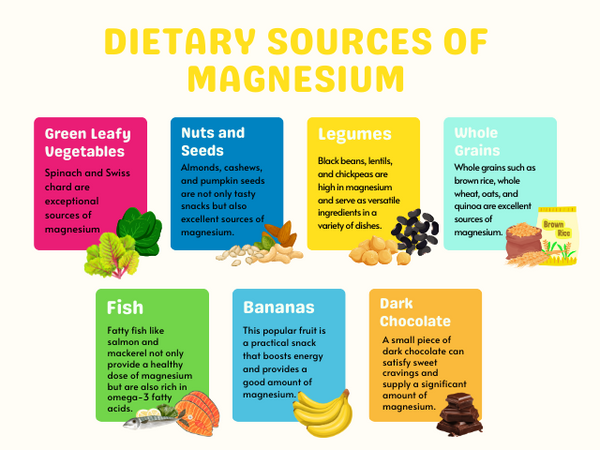
Despite magnesium being naturally abundant, many people still struggle to consume adequate levels of this nutrient through their diet alone. This often prompts a closer look at both the dietary sources and supplemental forms of magnesium, especially for growing children whose developmental needs make adequate magnesium intake imperative.
Understanding the various sources of magnesium can help ensure that children receive this important mineral in sufficient amounts to support their active growth and overall health. It's important to explore both natural dietary sources, rich in this mineral, and the supplements available on the market that can help bridge any nutritional gaps.
Dietary Sources and Supplements
When aiming to increase magnesium intake, it's essential to know which foods and supplements can effectively boost magnesium levels. Here's a closer look at the variety of sources available:
- Green Leafy Vegetables: Spinach and Swiss chard are exceptional sources of magnesium, that help for many body functions including muscle and nerve function, and blood pressure regulation. These vegetables pack a substantial amount of this mineral in just a small serving. Including them in meals not only boosts magnesium intake but also provides vitamins A, C, and K, along with dietary fiber, which supports overall health and digestion.
- Nuts and Seeds: Almonds, cashews, and pumpkin seeds are not only tasty snacks but also excellent sources of magnesium. A handful of these nuts and seeds can contribute significantly to the daily magnesium requirement, while also offering proteins and healthy fats that are vital for brain health and energy levels. They're also rich in other nutrients like vitamin E, which helps protect the body from oxidative damage.
- Legumes: Black beans, lentils, and chickpeas are high in magnesium and serve as versatile ingredients in a variety of dishes. They are also packed with fiber and protein, making them a great choice for a heart-healthy diet that promotes stable blood sugar levels. Legumes can be a cornerstone for meals aimed at improving digestive health and increasing nutrient intake.
- Whole Grains: Whole grains such as brown rice, whole wheat, oats, and quinoa are excellent sources of magnesium. These grains support a healthy diet by providing additional fiber, which aids in digestion and prolongs the feeling of fullness. They also contain B vitamins and important minerals like selenium and iron, which are essential for overall health.
- Fish: Fatty fish like salmon and mackerel not only provide a healthy dose of magnesium but are also rich in omega-3 fatty acids, known for their benefits to heart health and cognitive function. Regular consumption of these fish can help reduce inflammation and promote better cardiovascular health.
- Bananas: This popular fruit is a practical snack that boosts energy and provides a good amount of magnesium. Bananas are also rich in potassium, which is important for heart health and proper muscle and nerve function. Their natural sweetness and energy-boosting carbohydrates make them an ideal pre- or post-exercise snack.
- Dark Chocolate: A small piece of dark chocolate can satisfy sweet cravings and supply a significant amount of magnesium. Dark chocolate is also loaded with antioxidants, specifically flavonoids, which have been shown to support heart health by lowering blood pressure and improving blood flow to the heart and brain.
Magnesium Gummies for Kids
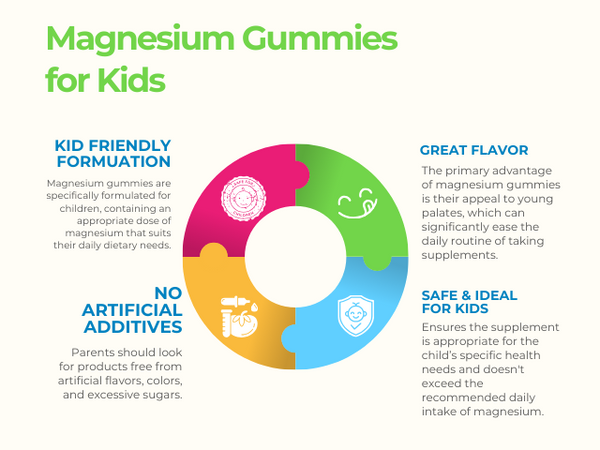
Magnesium gummies are a popular and effective way to ensure children meet their daily magnesium requirements. Designed to be a convenient and enjoyable option, these gummies come in various kid-friendly flavors and fun shapes, making them an attractive supplement choice for children who might be picky eaters or reluctant to take traditional pills or powders.
- Kid-Friendly Formulation: Magnesium gummies are specifically formulated for children, containing an appropriate dose of magnesium that suits their daily dietary needs. They are often combined with other vitamins and minerals, such as Vitamin D or calcium, which work synergistically with magnesium for better absorption and efficacy.
- Great Flavor: The primary advantage of magnesium gummies is their appeal to young palates, which can significantly ease the daily routine of taking supplements. Moreover, they are generally gentler on the stomach compared to some other forms of magnesium supplements, and they do not require water to swallow, making them handy for on-the-go situations.
- No Artificial Additives: When choosing magnesium gummies, parents should look for products free from artificial flavors, colors, and excessive sugars. It's also important to check that the magnesium form used in the gummy is easily absorbable, such as magnesium citrate, which is effective in addressing deficiency.
- Consulting Healthcare Providers: Although magnesium gummies are a convenient supplement, parents must consult with a healthcare provider before starting any new supplement regimen. This ensures the supplement is appropriate for the child’s specific health needs and doesn't exceed the recommended daily intake of magnesium.
Addressing Magnesium Deficiency in Children
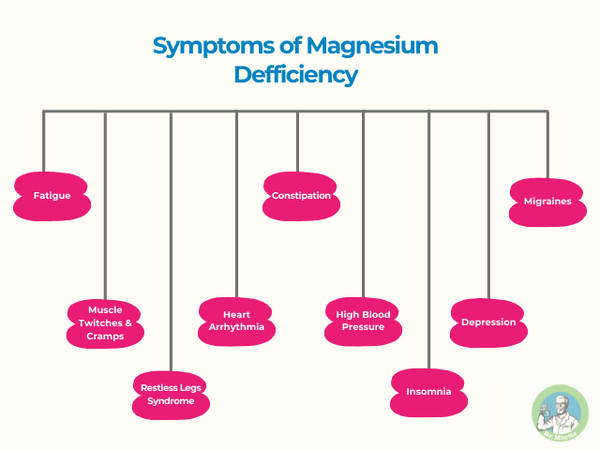
Magnesium deficiency in children can impact numerous aspects of health and development, making its prompt identification and treatment crucial. Below is an exploration of the signs, diagnostic approaches, and effective treatment strategies for managing magnesium deficiency in children.
Signs of Deficiency and Diagnostic Approaches
Symptoms of Magnesium Deficiency
Magnesium deficiency in children may not always be obvious since the symptoms can be subtle or similar to other conditions. Common signs include:
- Muscle cramps and spasms: Due to magnesium's role in muscle relaxation.
- Fatigue and weakness: Magnesium is vital for energy production.
- Nervous system issues: Such as irritability, mood swings, and difficulty concentrating, reflecting magnesium's role in neurological function.
- Delayed growth: In more severe cases, due to magnesium's importance in bone health.
Children who consume inadequate dietary magnesium, those with chronic illnesses, or those on certain medications may be at increased risk for deficiency.
Diagnostic Approaches
Diagnosing magnesium deficiency involves a combination of clinical assessment and laboratory tests. While serum magnesium levels can offer some insight, they do not always accurately reflect total body magnesium levels. More comprehensive tests might include intracellular magnesium concentration in red or white blood cells or a 24-hour urine magnesium test. Healthcare providers will consider both symptoms and test results when diagnosing magnesium deficiency.
Treatment Strategies
Effective Treatments
Treatment for magnesium deficiency typically involves dietary modifications and, in some cases, supplementation. Strategies include:
- Increasing dietary intake: Incorporating magnesium-rich foods such as leafy greens, nuts, seeds, and whole grains into the child's diet.
- Magnesium supplements: If dietary adjustments are insufficient or if the deficiency is severe, oral magnesium supplements may be prescribed. The form and dosage of magnesium will depend on the child's specific needs and tolerance.
Prevention Methods
Preventive measures are often the best approach to managing magnesium deficiency. Ensuring a balanced diet that regularly includes high-magnesium foods can prevent deficiencies. Regular medical check-ups that include discussions about diet and lifestyle can help catch any potential deficiencies early.
Overall, addressing magnesium deficiency in children requires a proactive approach that combines careful monitoring of symptoms with strategic dietary and supplemental interventions. Regular consultations with a healthcare provider are essential to tailor the approach based on the child's health status and nutritional needs.
Types of Magnesium Supplements for Kids
When considering magnesium supplements for children, it's crucial to choose a form that is effective and safe. Below, we explore several types of magnesium supplements, focusing on their benefits, considerations, and common uses.
Remember: While magnesium is generally safe, it's important to adhere to recommended dosages to avoid side effects such as diarrhea or abdominal discomfort. Parents should consult healthcare providers to determine the right dose for their child.
Choosing the Right Magnesium Supplement

Selecting the right magnesium supplement for a child involves considering the specific needs and health conditions of the child, as well as the bioavailability and potential side effects of the supplement. Consulting with a pediatrician or a nutritionist can help ensure that the chosen supplement is safe and effective for the child’s age and health requirements.
Find the Best Magnesium for Kids
Selecting the right magnesium supplement for children involves a thoughtful consideration of various factors to ensure safety, effectiveness, and ease of use. Below are key considerations when choosing the best magnesium supplement for a child:
Type of Magnesium
Different forms of magnesium have different absorption rates and uses:
- Magnesium Citrate: Magnesium citrate is known for its bioavailability, meaning it's easily absorbed by the body. This makes it an excellent choice for quickly addressing magnesium deficiencies in children. It's effective in promoting regular bowel movements, which is beneficial for children who suffer from constipation.
- Magnesium Oxide: This form of magnesium is often used to relieve digestive issues like heartburn and constipation due to its laxative effect. However, magnesium oxide is not as readily absorbed as other forms, which means it may not be the best choice for addressing a deficiency.
- Magnesium Chloride: Known for its excellent absorption rate, magnesium chloride can be used both orally and topically. It is particularly useful for children who have difficulty with oral supplements, as it can be applied to the skin in lotion or oil form.
- Magnesium Glycinate: Highly recommended for children, magnesium glycinate is bound to glycine, an amino acid that itself has calming properties. This form is gentle on the stomach and less likely to cause laxative effects, making it ideal for long-term use and for children with sensitive digestive systems.
- Magnesium Lactate: This form is considered gentler on the digestive system and is commonly recommended for those who require large doses of magnesium. It's suitable for children who may not tolerate other forms well.
- Magnesium Taurate: Combining magnesium with taurine, magnesium taurate is often chosen for its cardiovascular benefits. It is gentle on the stomach and is considered beneficial for children with cardiovascular concerns.
Dosage
The appropriate dosage of magnesium varies based on the child's age, dietary intake, and health conditions. Over-supplementation can lead to adverse effects like diarrhea, so it's crucial to follow the recommended dietary allowances (RDAs) for magnesium, which are:
- Ages 1-3: 80 mg/day
- Ages 4-8: 130 mg/day
- Ages 9-13: 240 mg/day
Always start with the lowest possible dose and adjust as necessary under the guidance of a healthcare provider.
Additional Ingredients
Many magnesium supplements come with added ingredients such as vitamins, minerals, or herbal extracts. While some of these combinations can be beneficial, such as magnesium with vitamin D for better absorption and bone health, parents should be wary of products with unnecessary additives or high sugar content, especially in gummy forms.
Form of Supplement
The choice between pills, powders, liquids, or gummies depends on the child's preferences and ability to ingest supplements. Gummies are often more appealing to children but check the sugar content and ensure it does not contribute to excessive sugar intake.
Allergens and Sensitivities
Check for potential allergens like gluten, soy, dairy, or artificial colorings and flavorings, particularly if the child has specific dietary restrictions or sensitivities.
Brand Reputation and Quality
Opt for brands that are transparent about their sourcing and manufacturing processes and have a good reputation for quality. Look for supplements that are certified by third-party organizations like the US Pharmacopeia (USP), NSF International, or ConsumerLab, which test for purity and adherence to label claims.
Safety and Dosage Guidelines for Magnesium Supplements for Kids

When considering magnesium supplementation for children, safety and appropriate dosage are paramount. Here’s a detailed guide on how to navigate these aspects responsibly:
Recommended Dosages
The appropriate dosage of magnesium depends on the age and sometimes the specific health needs of the child. Here are the general recommended dietary allowances (RDAs) set by health authorities:
- Infants (under 1 year): The dosage varies from 30 mg to 75 mg, which is typically met through breast milk or formula.
- Children 1-3 years: 80 mg per day
- Children 4-8 years: 130 mg per day
- Children 9-13 years: 240 mg per day
- Teens 14-18 years: 410 mg per day for boys and 360 mg per day for girls
These dosages are designed to meet the daily requirements without the risk of deficiency. However, dosages might need adjustments based on a child’s specific health conditions and dietary intake, which should always be done under the supervision of a healthcare provider.
Potential Side Effects
While magnesium is generally safe when taken in appropriate dosages, excessive intake can lead to side effects, especially with high doses or if the child has certain health conditions. Potential side effects include:
- Diarrhea: This is the most common side effect, particularly with magnesium forms like citrate or oxide, which have a laxative effect.
- Nausea and abdominal cramping: High doses can upset the stomach and cause discomfort.
- Interference with medications: Magnesium can interact with various medications, including antibiotics and diuretics, affecting their absorption and efficacy.
Children with kidney issues should be particularly cautious, as their kidneys may not be able to remove excess magnesium effectively, leading to more serious complications.
Monitoring and Adjustments
It's important to monitor the child's response to magnesium supplementation and adjust the dosage if necessary. Signs of excessive magnesium might include reduced appetite, lethargy, or changes in heart rate. If any of these symptoms occur, or if there’s any concern about the child's reaction to magnesium supplements, consulting a healthcare provider is essential.
Research Insights: Magnesium’s Impact on Child Health

Scientific Studies and Findings
Recent research has increasingly highlighted the significant role that magnesium plays in the health and development of children, including its effects on those with Attention Deficit Hyperactivity Disorder (ADHD).
General Health Benefits
Studies have consistently shown that magnesium is essential for the proper development of bones in children. A lack of magnesium can lead to weaker bones and an increased risk of fractures. Additionally, magnesium contributes to the healthy function of nerves and muscles, supports the immune system, and aids in the maintenance of steady heart rhythms and blood sugar levels.
For example, a study published in the "Journal of the American College of Nutrition" found that higher dietary magnesium intake was associated with improved insulin sensitivity and reduced inflammation in children. This suggests that adequate magnesium levels can help prevent chronic diseases later in life.
Impact on ADHD
Magnesium's role in neurological health is particularly significant. Research indicates that magnesium supplementation may help alleviate symptoms of ADHD in children. Magnesium aids in regulating neurotransmitters in the brain, which can improve attention, reduce hyperactivity, and stabilize mood.
One study noted in the "Journal of Pediatrics" reported that children with ADHD who received magnesium supplementation showed significant improvements in hyperactivity and attentional behaviors.
FAQs on Magnesium Supplements for Kids
Common Questions and Expert Answers
Q1: How do I know if my child needs magnesium supplements?
Signs that your child might need magnesium supplements include frequent muscle cramps, trouble sleeping, irritability, and fatigue. However, it's essential to consult with a pediatrician who can recommend blood tests to confirm magnesium deficiency before starting any supplements.
Q2: What are the best forms of magnesium for children?
The best forms of magnesium for children are often those that are easily absorbed and gentle on the stomach. Magnesium glycinate is popular for its high absorption rate and minimal gastrointestinal side effects. Magnesium citrate is also effective, especially for children dealing with constipation, as it has a natural laxative effect.
Q3: Are there any side effects of magnesium supplements in children?
Yes, while magnesium is generally safe, excessive intake can lead to side effects such as diarrhea, abdominal pain, and nausea. It's important to stick to the recommended dosages based on the child's age and weight to avoid these issues.
Q4: Can magnesium supplements improve my child's behavior or concentration?
Some studies suggest that magnesium supplements can help improve behavior and concentration in children, particularly those with ADHD. Magnesium plays a role in regulating neurotransmitter activity in the brain, which can affect attention and impulse control.
Q5: How can I ensure my child gets enough magnesium from their diet?
To ensure your child gets enough magnesium, include foods rich in magnesium in their diet. Good sources include leafy green vegetables, nuts, seeds, whole grains, and legumes. Regularly incorporating these foods can help maintain adequate magnesium levels.
Q6: What is the recommended daily intake of magnesium for children?
The recommended daily intake varies by age:
- Ages 1-3: 80 mg
- Ages 4-8: 130 mg
- Ages 9-13: 240 mg
- Adolescents 14-18: 360 mg for girls and 410 mg for boys. It's important to adjust these amounts based on the child's overall diet and health status.
Q7: Can magnesium interact with other medications my child is taking?
Yes, magnesium can interact with several types of medications, including some antibiotics and medications for osteoporosis and other chronic conditions. Always discuss with your pediatrician or a pharmacist before starting magnesium supplements if your child is on medication.
Consulting Healthcare Professionals
When to Seek Professional Advice
Knowing when and how to seek advice from healthcare providers regarding magnesium supplementation for your child is crucial to ensure their safety and well-being. Here are some guidelines on when to consult a healthcare professional:
1. Before Starting Supplements: Always consult a pediatrician or a healthcare provider before beginning any new supplement regimen. This is especially important if your child has existing health conditions or is taking other medications, as magnesium can interact with various drugs.
2. Observing Symptoms of Deficiency or Excess: If you notice symptoms that could indicate either a deficiency (like frequent muscle cramps, fatigue, or irritability) or an excess of magnesium (such as diarrhea, abdominal pain, or lethargy), it's essential to seek professional advice. A healthcare provider can order the appropriate tests, like serum magnesium levels, to assess the situation accurately.
3. Regular Health Check-Ups: During regular health check-ups, discuss your child's diet and whether it includes sufficient magnesium-rich foods. These conversations can help prevent deficiencies and ensure that supplementation is only used when necessary.
4. When There Are Dietary Restrictions: For children with dietary restrictions, whether due to allergies, intolerances, or specific diets (like vegetarian or vegan diets), consulting a nutritionist or a pediatrician can help plan a diet that covers all nutritional needs, including adequate magnesium levels.
5. Evaluating Long-Term Supplementation Needs: If your child has been recommended long-term magnesium supplementation due to a chronic condition, regular consultations with healthcare professionals are necessary to monitor the effectiveness and adjust dosages as needed.
How to Consult Healthcare Providers
When approaching a healthcare provider about magnesium supplementation, here are some tips to ensure a productive consultation:
- Be Prepared: Bring any notes on your child’s symptoms, diet, and any current medications or supplements they are taking.
- Ask Specific Questions: Prepare specific questions about magnesium supplementation, such as potential benefits, recommended types and dosages, and possible interactions with other medications.
- Discuss All Options: Be open to discussing both dietary sources of magnesium and supplements, and ask about the pros and cons of each.
- Follow-Up: Schedule follow-up appointments to monitor your child’s response to the supplementation and adjust the plan as needed.
For further reading, check out our other articles on magnesium for kids below:
ADHD is a Nutritional, Not a Mental Problem
From Toddlers to Teens: Tailoring Magnesium Citrate for Kids of Every Age Group
Chew on This: The Benefits and Convenience of Chewable Magnesium Gummies
Recognizing the significant role of magnesium in a child’s development empowers parents to support their health effectively. By incorporating magnesium-rich foods into diets and considering supplements where necessary, parents actively contribute to their child’s energy, bone health, and mental sharpness.

Dr. Moritz’s Magnesium Gummies for Kids offer a delightful, straightforward way for children to get their daily magnesium. These tasty gummies are specially formulated to support growing bodies, making it easy for your child to enjoy and benefit from essential nutrients. Shop today and help your child achieve better health.

